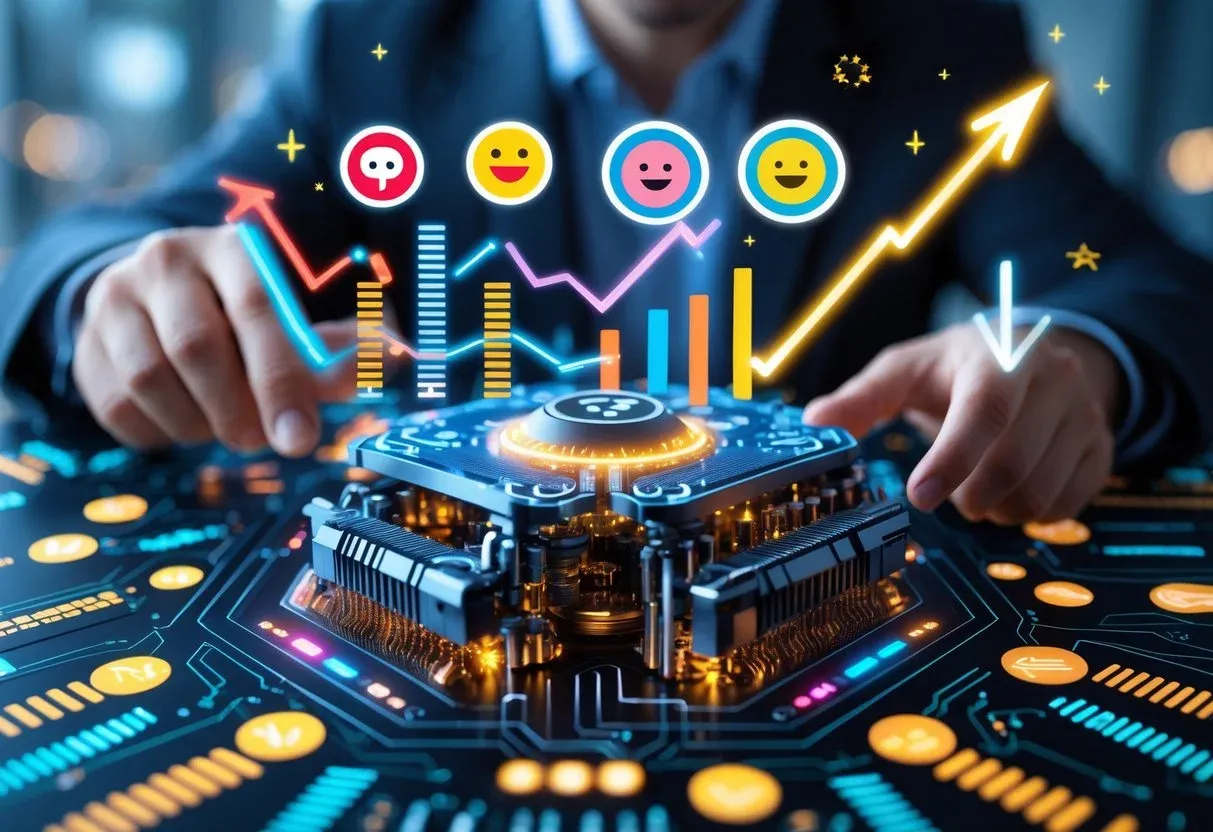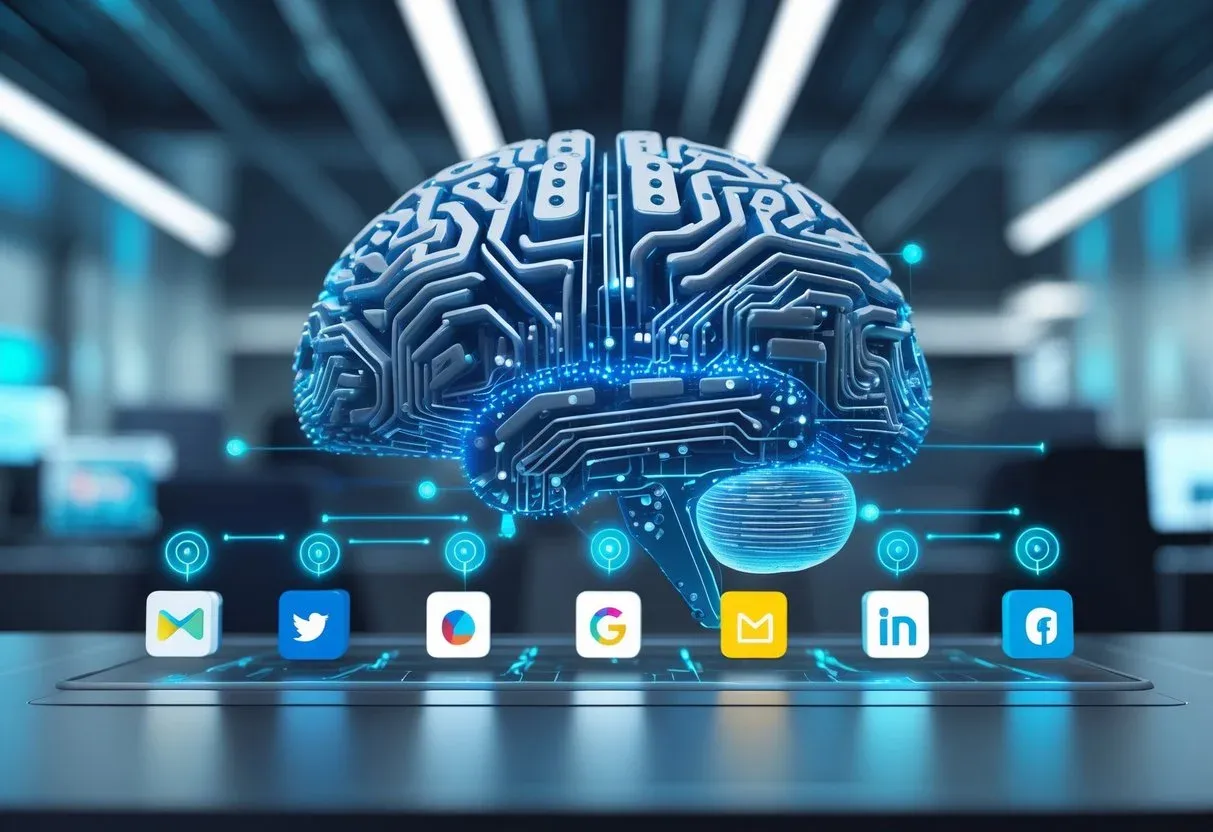How to Use AI Tools in Digital Marketing?

You can use AI tools in digital marketing to create content faster, analyze performance data, understand your audience, and improve campaign results. Whether you're writing social posts, tracking results, or adjusting ad strategies, AI can automate the heavy lifting and boost your results.
In this guide, you’ll learn how to properly use AI tools in digital marketing — with real examples and easy-to-follow steps for beginners.
Key Takeaways:
- AI streamlines the entire marketing workflow — from content creation to campaign optimization — saving time and boosting results.
- You don’t need to be a tech expert — beginner-friendly tools like ChatGPT, Canva, and Notion AI make advanced marketing tasks simple.
- The key is consistency and strategy — using AI with a clear workflow leads to smarter decisions and better performance over time.
How Can AI Help You Create Content Faster?

AI can help you brainstorm, write, and repurpose digital content in seconds—freeing you up to focus on strategy.
Whether you're writing blog posts, ads, or captions, AI tools can speed up the entire content creation process. You can go from a blank page to a complete draft or visual in minutes.
Key ways AI speeds up content creation:
- Brainstorm faster: Ask AI to suggest blog ideas, content angles, or trending topics.
- Write quicker: Generate first drafts of blog posts, emails, or product descriptions.
- Repurpose easily: Turn a single blog into tweets, carousels, emails, or video scripts.
- Design quickly: Use tools like Canva Magic Studio to make branded images or short videos.
Prompt ideas to try:
- “Give me 5 blog titles about eco-friendly pet products.”
- “Rewrite this product description to be funnier.”
- “Turn this article into a 5-part Instagram story.”
Popular tools:
| Tool | What It Does |
|---|---|
| ChatGPT or Claude | Write articles, product blurbs, and ad copy. Great for outlining or repurposing. |
| Jasper | Specializes in copywriting. Great for ads, CTAs, and tone testing. |
| Canva Magic Studio | Create branded images, reels, and social posts from text prompts. |
✅ Pro tip: Always edit and fact-check AI content before publishing. Use AI to draft, not to replace your voice.
👉 Check out this guide about best AI tools for product research if you are finding one.
How Can AI Help You Analyze Marketing Performance?

AI turns messy marketing data into quick, actionable insights—no spreadsheets required.
Analyzing performance is usually slow and tedious. But with AI, you can upload your reports and ask direct questions like:
- “Which emails got the best open rate last month?”
- “What time of day worked best for Facebook ads?”
- “Which campaign had the highest return on spend?”
What AI can help with:
- Summarizing performance (email stats, ad metrics, site traffic)
- Spotting patterns (drop-offs, high-converting pages, channel performance)
- Suggesting optimizations based on what worked and what didn’t
Prompt examples:
- “Analyze this GA4 report and list the 3 best-performing channels.”
- “Why did email clicks drop in March?”
- “What can I improve in this Shopify campaign?”
Recommended tools:
| Tool | Use Case |
|---|---|
| ChatGPT or Claude | Analyze raw data and answer questions in plain English |
| Excel Copilot | Clean, format, and visualize spreadsheet data |
| Notion AI | Summarize marketing notes, reports, or dashboards |
✅ Pro tip: Feed AI clean, organized data for the best results. Label columns and give some context first.
How Can AI Help You Understand Your Audience?

AI helps you analyze real feedback—so you can see what customers care about and what’s missing.
Your audience is telling you what they want all the time. AI makes it easier to listen. Instead of skimming 200 reviews or endless Reddit threads, AI can summarize patterns and key takeaways in seconds.
How AI reveals audience insights:
- Sort and summarize reviews, comments, or survey data
- Identify pain points, needs, and language your audience uses
- Generate content ideas based on common questions
- Create customer personas from real-world data
Try prompts like:
- “Summarize the top complaints in these reviews.”
- “What are 3 feature requests from this feedback?”
- “Create 2 customer personas based on this survey data.”
Helpful tools:
| Tool | Use Case |
|---|---|
| ChatGPT | Analyze and summarize customer input or survey answers |
| AlsoAsked / AnswerThePublic | Find what users are asking online |
| Google Sheets AI | Organize review data to track sentiment or trends |
✅ Pro tip: Use AI insights to update your copy, build better FAQs, or shape your next product idea.
How Can AI Improve Your Campaigns in Real-Time?

AI helps you test, tweak, and personalize your campaigns as they run—so you can adapt faster.
Instead of setting and forgetting your campaigns, you can use AI to adjust weak points in real time. Rewrite underperforming ads, A/B test headlines, or adjust CTAs based on new trends—all without redoing your entire campaign.
Real-time ways AI can help:
- Suggest better wording for email subject lines or ad copy
- Generate A/B test variations of headlines or offers
- Personalize content for different audiences (e.g. new vs loyal users)
- Simulate results across segments to predict performance
Example prompts:
- “Rewrite this ad for Gen Z.”
- “Give me 3 CTA versions for returning customers.”
- “What image concept might perform better with female users?”
Tools to try:
| Tool | Use Case |
|---|---|
| ChatGPT or Jasper | Improve copy, suggest ad variations, tweak CTAs |
| ManyChat / Tidio | Optimize chatbot flows and improve conversion rates |
| AdCreative.ai | Auto-generate optimized creatives and predict performance |
✅ Pro tip: Set up AI to augment your live campaigns, not replace them. Always test and monitor results.
👉 Check out this guide about best AI chatbot for ecommerce to help you in doing your campaign.
How Do You Build a Simple AI Workflow for Marketing?

Start with one repeatable workflow where AI supports you from content planning to performance review.
Don’t try to do everything at once. Pick one type of content (like a blog post or product launch), and build a step-by-step process that includes AI at each stage.
Sample AI-powered marketing workflow:
- Plan content strategy using ChatGPT or Claude (“Give me 5 blog ideas for pet wellness.”)
- Write the draft with AI writing tools
- Design visuals in Canva or Adobe Firefly
- Repurpose across channels (emails, social, ads)
- Launch your campaign via scheduler (Buffer, Metricool)
- Analyze performance with Notion AI or Excel Copilot
- Improve next time using feedback and AI-generated suggestions
Tool stack to consider:
| Stage | Tool |
|---|---|
| Planning & writing | ChatGPT, Claude |
| Visuals | Canva Magic, Adobe Firefly |
| Publishing | Zapier, Buffer, Metricool |
| Analytics | Notion AI, Google Sheets AI |
✅ Pro tip: Connect tools with Zapier or Make to save time and avoid copy-pasting across platforms.
Final Thoughts: Is AI Worth Using in Digital Marketing?
Yes—AI helps marketers do more, faster. But you still need strategy, creativity, and judgment.
AI isn’t magic. It won’t replace you—but it will make you better at your job. You’ll work faster, test more ideas, and get results without burning out.
Final tips for getting started:
- Start small: Pick one task to automate (like writing subject lines or analyzing one campaign)
- Test everything: AI gives ideas, not guarantees
- Build your stack over time: Don’t overwhelm yourself with too many tools
- Keep the human touch: Edit, personalize, and lead with empathy
🎯 Next step: Try using AI on your next email, blog, or campaign report—and see how much time you save.
Frequently Asked Questions

1. What are the best AI tools for digital marketing?
The best AI tools include ChatGPT for writing, Canva Magic Studio for visuals, Jasper for ad copy, Notion AI for analysis, and Surfer SEO for optimization. Each tool serves a specific part of the marketing workflow.
2. Can AI improve email marketing performance?
Yes. AI can personalize subject lines, segment audiences, optimize send times, and even write engaging email copy to boost open and conversion rates.
3. How accurate is AI in analyzing marketing performance?
AI is highly accurate when trained on clean, relevant data. It can summarize trends, detect patterns, and highlight issues faster than manual analysis—especially with tools like GA4 exports or CRM data.
4. Can AI tools create customer personas?
Yes. AI can analyze reviews, surveys, and user feedback to generate detailed customer personas, including pain points, preferences, and buying behavior.
5. How does AI optimize campaigns in real time?
AI can rewrite underperforming ads, test new headlines, adjust bids, and personalize content on the fly—helping marketers improve ROI without restarting entire campaigns.
6. Do I need coding skills to use AI in marketing?
No. Most AI tools today are no-code or low-code, designed for marketers without technical backgrounds. Tools like ChatGPT, Canva, and Zapier are easy to use out of the box.
7. How do AI tools integrate with existing marketing workflows?
AI tools connect through APIs, plugins, and automation platforms like Zapier or Make. This lets you link writing tools, analytics, and ad platforms into one smooth system.
8. Is AI-driven marketing cost-effective for small businesses?
Yes. AI helps small businesses save time, reduce hiring costs, and scale content or analysis with fewer resources—making it a cost-efficient option for lean teams.
9. Are there legal or ethical risks using AI in digital marketing?
Yes. Risks include privacy issues, biased outputs, and unclear sourcing. Marketers should follow data protection laws and review AI-generated content carefully.
10. What is the future impact of AI on digital marketing jobs?
AI won’t replace marketers—it will shift their roles. Routine tasks will be automated, while creativity, strategy, and human insight will become more valuable.
Want to Grow Your Digital Biz—Without Burning Out?
Join our mini-course at WAH Academy and have guidance on how to use AI tools to boost content, automate marketing, and grow your income—no tech brain required.
No overwhelm. No guesswork. Just clear steps that actually work.
Tap the button and start building smarter, not harder.
